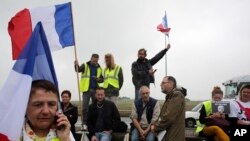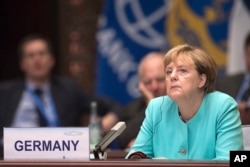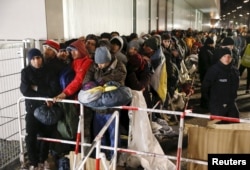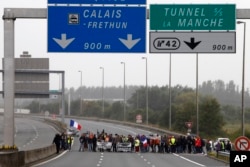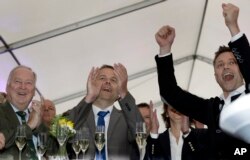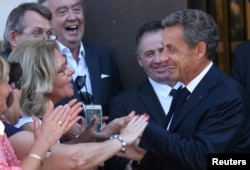Irate truckers and farmers in France began the week by blocking traffic around the northeastern port city of Calais, in the latest noisy protest against a growing migrant problem with no easy solution.
In Germany, Chancellor Angela Merkel and her center-right Christian Democratic Union party are weighing their next steps after being defeated by an upstart anti-immigrant party in her home state.
Speaking to reporters at the recently concluded G-20 summit in Hangzhou, China, Merkel took personal responsibility for the losses, but stood firm on her asylum stance.
"Of course that has to do with refugee policies," she said. "Nevertheless, I still hold though that the decisions, as they were made, were the right ones."
The events and contexts could not be more different, but both underscore how Europe’s unresolved migrant crisis is coloring the politics of its two biggest heavyweights as they head toward national elections next year.
Voters' sentiments
In both countries, voter concern about immigration goes beyond its effect on jobs and the economy, tapping into broader public frustration, says Manuel Lafont Rapnouil, head of the European Council on Foreign Relations’ Paris office.
“Voters are fed up,” he says. “And that resonates beyond economic and social issues to a real identity crisis. It’s not just people’s sense that their situation is not going to improve, but that immigration may change society as they know it.”
Analysts and politicians describe Sunday’s parliamentary vote in Germany's Mecklenburg-Vorpommern state as a rebuke to a year-old immigration policy in which the country took in more than one million asylum seekers last year alone.
Merkel’s Christian Democrats, or CDU, placed third in the results with just 19 percent of the vote, behind the right-wing Alternative for Germany (AfD) party and its national Social Democrats coalition partner, which placed first.
Bavarian Finance Minister Markus Soeder, of the CDU's state sister party, the Christian Social Union, called the results a “wake-up call” for Merkel to adopt a tougher stance on immigration ahead of next year’s general election. Some reports even mull whether the 62-year-old leader will step down after 11 years in office.
“It is no longer possible to ignore people’s views on this issue,” Soeder told a regional paper, in remarks re-transmitted by German broadcaster Deutsche Welle. “Berlin needs to change tack.”
In France, Monday’s protests in Calais also underscore a broader public frustration over the leftist government’s migration policy.
A long chain of vehicles blocked the main highway into the city, as truckers and local farmers protested the violent tactics of asylum seekers desperate to reach Britain and other favored countries. Calais residents formed a human chain, calling for the speedy dismantling of a sprawling camp known as the “jungle.”
France’s leftist government partially razed the camp earlier this year, but its population has since grown to at least 7,000; activists place the number at 9,000. French authorities promise to finish the job by year’s end, but critics say that is not soon enough.
‘We need to keep up the pressure” on the government to dismantle the camp within a month, Frederic Van Gansbeke, spokesman for a Calais business association, told French radio, estimating the town’s migrant problem has hit local commerce hard.
In both Germany and France, the far right is riding a wave of public discontent over immigration that has been fed by recent terrorist attacks in both countries.
Germany’s AfD party is celebrating its results in Sunday’s state election, in which it captured 21 percent of the vote. The three-year-old party has so far won seats in nine of Germany’s 16 state parliaments.
France's Front National
In France, many polls suggest Marine Le Pen, head of the anti-immigrant National Front, will lead in the first round of presidential elections next April, but fail to win the runoff.
Meanwhile, some center-right candidates like former French President Nicolas Sarkozy are borrowing some of the Front’s hard-line rhetoric on matters like curbing migration, Islam and French nationality.
On Monday, Sarkozy called for setting up migrant ‘detention centers’ in Britain, to which Calais asylum seekers would be sent.
“It’s not on French soil that we must address the admission records to enter the UK,” he told the regional La Voix du Nord newspaper.
Still, many differences exist between the two countries, analyst Lafont Rapnouil notes.
“The German situation is a very sudden influx of migrants arriving and of the infrastructure not being able to cope,” he says, while immigration is perceived to have risen steadily in France over the past half century, pushed by a post-war drive for more labor.
Different attitudes
There are also sharp disparities in public attitudes toward migration. Germany has long accepted the need for more immigration for its economy to grow and shore up a declining and aging population.
In France, “You don’t have the dominant perception that migration is good for the economy — quite the contrary,” Lafont Rapnouil said.
France has also witnessed long-simmering tensions with its large Muslim population, underscored most recently in a series of town bans against the burkini, an all-covering Islamic swimsuit.
While Germany is home to a large Turkish community, many of the recent tensions, including this summer’s terror attacks, involve the new asylum seekers.
Yet for both countries, anti-immigration candidates are playing on similar fears and messages, Lafont Rapnouil says.
“They’re playing the card, ‘I will get control back over the events,’” he said. “I’m not saying they’re all the same, but that’s the message they all share. And it does resonate when it comes to public opinion.”




